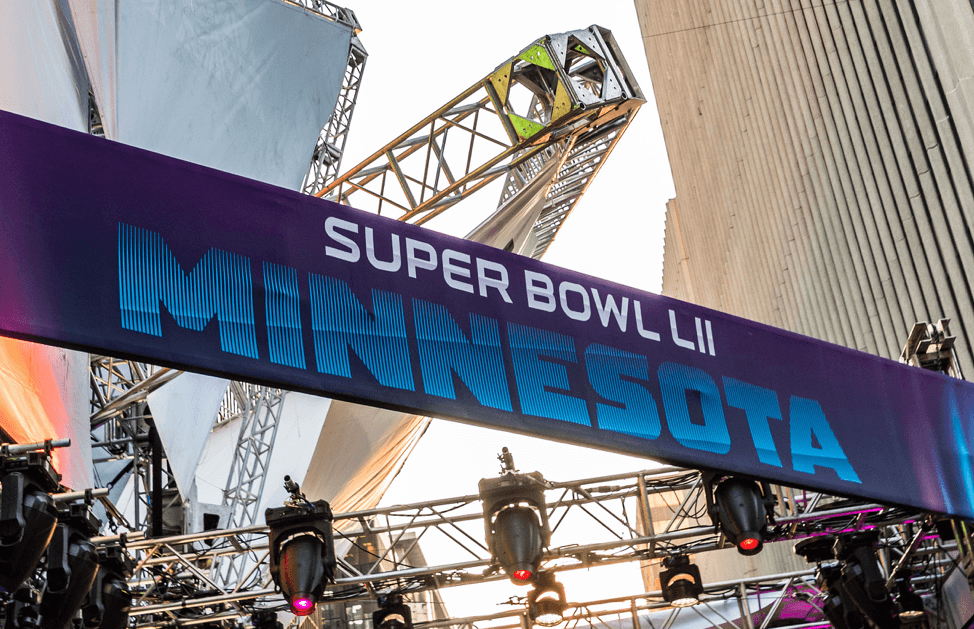As Minneapolis prepared to host the “big game,” the NFL geared up to protect their trademark on the use of the phrase “Super Bowl” from counterfeiters and unlicensed advertisers. 1 Together with New England Patriots LLC and Philadelphia Eagles LLC, NFL Properties sued large-scale professional counterfeiters planning to sell merchandise and tickets with the NFL’s trademarks and logos. 2 Filing the suit in Hennepin County District Court, the NFL is asking a Minnesota judge to grant local police the power to seize counterfeit merchandise and tickets, arguing that counterfeiters injure the public by selling them substandard products disguised as genuine NFL products. 3 The NFL received a similar order from the same court in 1992 when Super XXVI was hosted in Minneapolis. 4
The current lawsuit is not unique from lawsuits filed by the league in the past; the NFL regularly files trademark infringement suits with unnamed defendants, such as “Does 1-100” in this case, in an attempt to prevent the production and sale of counterfeit items. 5 The complaint points to the difficultly in defending the trademark, arguing that the migrant defendants often use fictitious names or business address and, after flocking to the city to sell their counterfeit merchandise and tickets for cash, disappear without a trace. 6 Even with nearly 180 companies receiving national licenses to use NFL trademarks annually, the counterfeit market remains a point of concern for the NFL. 7
With over 100 million viewers in the U.S. alone watching the Super Bowl each year, the NFL’s harsh enforcement of their trademark may seem trivial, or even greedy, to the average person. 8 However, defending a trademark is a defining element of being a trademark owner. 9 A trademark is a word, symbol, device, or any combination of three which can be used to identify and distinguish the goods or services of one seller or provider from the goods or services of another and to indicate the source of the goods or services. 10 When determining whether trademark infringement has occurred, courts generally consider whether a consumer is likely to be confused as to the source of the goods or services by the allegedly infringing usage. 11 If the NFL were to fail to enforce their trademark, it would be weakened and could even lead to the forfeiture of certain remedies for trademark infringement. 12
For example, in Abraham v. Alpha Chi Omega, the Fifth Circuit sided with a business selling fraternity and sorority paddles which began before Greek Organizations began issuing licenses for their trademarked names. 13 Due to Alpha Chi Omega’s failure to enforce their trademark without any justifiable basis for doing so and the prejudice that the delay in enforcement would have on Abraham, who in no way attempted to deceive consumers regarding the connection between his company and the Greek organization, the Court found that an implied and revocable trademark license had been establish. 14 The decision prevented Alpha Chi Omega from receiving monetary damages, but did not prevent injunctive action. 15 Future injunctive action, however, would be evaluated based on the degree to which the trademark owner’s delay would prejudice the infringing party. 16
Given the repercussions of failing to enforce trademarks, the NFL’s efforts extend beyond counterfeit merchandising. 17 In 2007, an Indianapolis church which advertised a “Super Bowl” party and planned to charge admission to view the game on screen larger than 55-inches received a warning letter from the NFL about its trademark infringement. 18 Since then, the NFL has loosened it policies regarding watch parties, allowing for the word “Super Bowl” and team names to be used but barring admission fees. 19
The NFL’s notoriously strict enforcement also extends to commercials and other forms of advertising. Due to high viewership, 30-second Super Bowl advertisements regularly sell for $4 million, meaning some brands do not want to pay the extra licensing fee to use the trademarked “Super Bowl.” 20 The tight regulations have led to some creative workarounds by companies like Delta and Nike, who avoided using the trademark by referring to the Super Bowl as “the pro football championship,” “the Big Game,” and “Championship Sunday.” 21 As the host of the “Colbert Report,” Stephen Colbert joined in on the common practice of avoiding the trademark by referring to his coverage of the Super Bowl as the “Superb Owl” coverage, in anticipation of “Sunday’s Tight Pants Man Clash.” 22 While the shrewd enforcement of the NFL’s trademark may be frustrating for public figures who want to show their support for the Super Bowl, for now they will just have to sit back and enjoy the “Big Game.”
- Michelle Fabio, Super Bowl Legal Blitz: Inside the NFL’s Legendary Trademark Defense, Forbes (Jan. 30, 2018, 6:20 AM), https://www.forbes.com/sites/michellefabio/2018/01/30/inside-the-nfls-legendary-trademark-defense/#55ae2063293a. ↩
- Dionne Cordell-Whitney, Patriots, Eagles Team Up Against Super Bowl Counterfeiters, Courthouse News Service (Jan. 29, 2018), https://www.courthousenews.com/patriots-eagles-team-up-against-super-bowl-counterfeiters/. ↩
- Id. ↩
- Id. ↩
- Fabio, supra note 1. ↩
- Cordell-Whitney, supra note 2. ↩
- Id. ↩
- Id. ↩
- Fabio, supra note 1. ↩
- Fabio, supra note 1. ↩
- Id. ↩
- Id. ↩
- Trademark Disputes Case Study: Abraham v. Alpha Chi Omega, Secure Your Trademark, https://secureyourtrademark.com/blog/trademark-disputes-case-study-abraham-v-alpha-chi-omega/. ↩
- Id. ↩
- Id. ↩
- Id. ↩
- Fabio, supra note 1. ↩
- Id. ↩
- Id. ↩
- Jack Linshi, Here’s Why Companies Can’t Say ‘Super Bowl’ In Their Super Bowl Ads, Time (Jan. 20, 2015), http://time.com/3674416/super-bowl-nfl-copyright-ads/. ↩
- Id. ↩
- Tony Maglio, Stephen Colbert Finds NFL Trademark Loophole: Prepare for ‘Colbert Report’ ‘Superb Owl XLVIII’ (Video), The Wrap (Jul. 10, 2014, 7:02 PM), https://www.thewrap.com/stephen-colbert-finds-loophole-nfl-trademark-get-ready-colbert-report-superb-owl-xlviii-video/. ↩

